Because of Rachel Held Evans
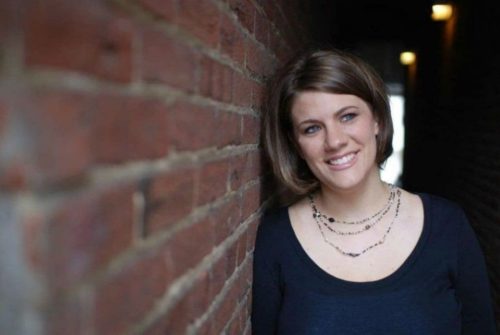
RNS/Courtesy of Macki Evans
The unexpected passing of Rachel Held Evans, the 37-year-old bestselling author and blogger who challenged the Evangelical Church and welcomed those excluded by it, is a loss felt by many. We at Faith And Reason encourage religious communities to follow her example of love and inclusion, bringing ALL people into the fold and honoring their diverse perspectives.
The news of Rachel’s passing traveled quickly, and the hashtag #becauseofRHE began trending on Twitter as her followers and friends shared how she had touched their lives. We invited Rev. Elizabeth Henry, Associate Chaplain at Millsaps College, and her students to share their own reflections.
Rev. Elizabeth Henry
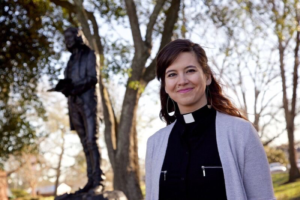
Rachel Held Evans slipped into a medically induced coma during Holy Week, and thousands of readers and followers and pastors and politicians joined to pray for her and to remark on the irony of her timing.
During this final week of Lent—the forty days prior to Easter in the Christian calendar—churches and Christians all over the world revisit the stories of the week leading up to Jesus’ crucifixion. They look human cruelty and the realities of suffering, injustice, and death full in the face in preparation for the celebration of Christ’s ultimate resurrection on Easter Sunday, where Christians proclaim our belief that Christ has conquered death, not erasing human suffering but swallowing it up in life. Christ has transformed the worst of human experience by plowing into it head-on with courage and grace.
Of course, Evans, a Christian author and speaker known for balancing her identity as a self-proclaimed “Bible nerd” with her characteristic wit, was in a coma on Good Friday. What better setup for a dramatic awakening on Easter than that?
As I followed the news of her illness (an infection, then an allergic reaction to the antibiotics used to treat it, led to seizures and the medically induced coma), I was shocked and worried and offered my prayers along with so many others. I checked the updates her husband posted everyday on her blog. I received text messages from friends and students who loved her as much as I did.
“She has to come out of this,” we all agreed. “We need her so much.”
Rachel was a unique voice in the Christian landscape. She had chronicled her own fundamentalist beliefs of childhood and the slow burn of questions and doubts and inconsistencies she encountered that eventually exploded her worldview and left her feeling adrift and alone. Then, she wrote about sifting through the shrapnel of her faith and building anew with the reclaimed wood of Scriptures that had been misappropriated to harm, and rituals and traditions that had been leveraged as tools of white supremacy and patriarchy.
Through her blogs, her social media presence, the conferences she helped to create and lead, she built a new kind of sanctuary for all those who felt isolated or abused or unwelcome in the old guard of evangelicalism and other mainline Christian denominations in the United States. People of color and LGBTQ+ folks and people who didn’t know whether they could really affirm all the “I believe…” statements in their church’s creeds and survivors of all kinds began to populate the pews, and they all joined to pray for Rachel as her coma wore on.
I joined them in encouraging others to pray for her healing, and for her husband and their young children as they waited for her to wake up. And I wondered how she would write about this particular season in a subsequent book one day. Obviously she’d make the aforementioned Good Friday/Easter resurrection jokes—it’s just too obvious not to go there. But how would she make meaning of it? What theological truths would she share using this powerful illustration from a dark moment in her life?
It never occurred to me that we might actually lose her. There was not a question of whether she would survive, only of how she would use this experience for good when she did. So when the news came Saturday that she had passed away early in the morning, I stood in the grocery store checkout line and read and re-read it in absolute shock. It did not seem possible that we’d actually lost her. It certainly was not fair.
Now, to be clear, Rachel Held Evans could not have picked me out of a crowd. She was a beloved and wildly successful author of a well-read blog and numerous books on faith, originator and collaborator in the creation of such conferences as Why Christian? and Evolving Faith, popular public speaker, and Christian influencer with an incredibly broad reach on social media. We had met only once in person at her Why Christian? conference in Chicago and engaged very sporadically online, like when I served on the launch team of her latest book, Inspired. And yet, I felt her loss like that of a beloved friend. And I am far from alone in this.
Evans curated a community of people who felt that something was missing in the ways they had been doing church. People with too many questions, people with the wrong convictions, people who loved in ways that were against the rules, and people that were somehow made to feel too much or too little in their churches found a home with Rachel, both in her own writings and among the people she drew together.
She was a magnet for anyone who felt that there was something more beneath the surface of their faith, particularly those who had been harshly reprimanded for pulling back the corner of the carpet in their own sanctuaries. Rachel became a bridge for so many who felt isolated or alienated by their church homes for any number of reasons, reaching out first through sharing her own stories of the deconstruction and eventual reconstruction of her faith and then by lifting up the voices of those who are so often ignored in mainstream conversations about faith and church and spirituality.
Through Rachel, I came to know many of the most influential teachers, speakers, and writers from a variety of races, ethnicities, nationalities, faith traditions, genders, and sexualities who teach me about the intersections of faith and justice my predominately white church tradition—no matter how well-meaning—was not equipped to explore well. Through her, I’ve been introduced to writers and pastors and friends whose names I only know because she shared them from her broad platform. And I am one of thousands who have recognized this truth. In fact, many have taken to social media to share their stories of her impact with the hashtag #BecauseofRHE.
I highly recommend a scroll through these powerful stories, which range from a few simple words to powerful, heartfelt articles by some of her closest friends on the influence of this incredible woman. Her legacy is one of profound beauty and broad impact, but there is one element of it in particular that I have witnessed firsthand with breathtaking gratitude. I believe that one of Rachel’s greatest gifts was that she helped many who had been wounded by the Church begin to feel safe exploring participating in a faith community again.
It’s no secret to “professional Christians” like myself (a clergywoman in the United Methodist Church) that church attendance and the role of faith communities is in decline for many Americans, particularly among millennials and Gen Z. But what we repeatedly see in research about this phenomenon is that these young people are not necessarily walking away from God—they are simply not finding God in traditional churches.
For many—and particularly those in marginalized communities based on gender identity, sexuality, physical abilities, race/ethnicity, etc.—church has become a place that wounds more than it heals. They still have a desire to connect with the Divine and to participate in a faith that connects them to others who are seeking to find meaning and belonging, but in too many cases, the Church has become more of a gatekeeper than a pathway to this kind of authentic, edifying relationship with God.
Rachel had a way of writing about this reality and naming the shortcomings in church and in Scripture that was disarming. In her writing, speaking, and collaborations, Rachel army-crawled her way under the barbed wire that had cut so many so deeply and left markers to a safer path, one that values honest questions, hard truths, and genuine relationships that value people over doctrines. She gave people permission and courage to give new faith communities another shot, even when they’d been deeply hurt by churches or Christians in the past. She gave us all permission to do church differently, to be more honest and raw and hopeful. In doing this, she gave us each other.
In the campus ministry I co-lead, we selected Evans’ latest book, Inspired—a hard look at what Scripture is and is not, and how it has been used for good and for ill in church traditions—as the discussion guide for our Lenten Bible study this year. As we slid into the biggest booth in the restaurant on campus before the discussion began, the first student there told us, “I know y’all and I trust you, but I was terrified to come to Bible study. It just has such a bad history for me. But I read Rachel’s book, and I’m here.”
This is Rachel’s legacy—or at least part of it. Those who were afraid found safety. Those who were confused and distressed were granted peace. Those who were alienated from religion became a fresh and loving faith community to one another. I am so thankful that some of the students that Rachel impacted have agreed to share their experiences with you here.
Rev. Elizabeth Henry is a deacon in the United Methodist Church currently serving as the Program Director for the Thriving In Ministry Program and the Associate Chaplain for Wesleyan Student Ministries at Millsaps College in Jackson, MS. In this role, she co-leads the Millsaps Wesley Connexion, a campus ministry of the United Methodist Church. She is a graduate of Baylor University where she earned her Bachelors of Social Work before attending graduate school at Duke Divinity School (MDiv) and the University of North Carolina-Chapel Hill (MSW).
Matty Cafiero, student
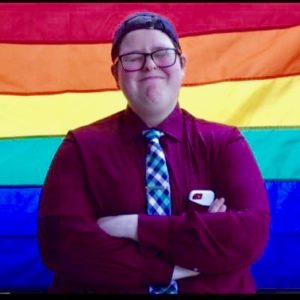
Growing up in a Southern Christian culture, certain beliefs get planted in your head about what it means to be a Christian. For many, these beliefs are rooted in God’s love for humanity and the hope for a world grounded in that love. For others, Christianity becomes more about who isn’t welcome than who is.
When I was around 14 years old I started to realize that my identity and the identity of a proper Christian teenage girl did not overlap in any of the right places. I wasn’t quiet, I hated wearing dresses to church, and I had entirely too many opinions on topics young girls were not supposed to be thinking about. For so long I had been taught that the word of God was definitive and unquestionable that upon realizing I had doubts about the way that my God was being presented in church, I felt like I had no choice but to turn away from religion altogether.
It wasn’t until I got to a Methodist college that all of the questions I had about faith and theology came boiling back up to the surface. Within my first two weeks at Millsaps college, I found myself sitting in the associate chaplain’s office multiple times with more questions than I ever thought possible. She didn’t have all of the answers, but she did have books. I am an avid reader, and the fact that there were books written by people who had been grappling with the same questions that I had, and had put all of my thoughts into words, changed everything for me. One of the first books I read was Searching for Sunday by Rachel Held Evans, and it was an absolutely life-altering experience.
Within the first chapter, I felt more seen than I ever had sitting in a church sanctuary. Rachel publicly wrote about all of the same struggles and doubts I was too ashamed to even privately think. All of the things about myself that I was taught were disappointing God were validated through Rachel’s words. By the end of the book, I was practically in a puddle of tears after finally hearing that no matter who I become, I will always be a child of God. When I left the church it was because the table of God just didn’t feel big enough to hold everything I had to offer, and with her words, Rachel pulled up a chair big enough for me and all of my questions and doubts.
The day after I finished Searching for Sunday, I went to my first Communion in over five years. And for the first time, I believed it when I heard that Jesus died for me. Following Communion, I was able to find a home with the Wesley student organization that very quickly became my family. It was with this group that I was introduced to Rachel Held Evans’ most recent, and last, book, Inspired. Inspired gave me permission to read the Bible for what it is: a messy, contradictory, library of books that has the power to save lives, rather than destroying them. It gave me permission to bring my whole self into the reading of scripture and feel no guilt in doing so.
Rachel saved my faith and, in the process, saved me, and I am forever grateful that she did. Having lost such a powerful voice, my only hope is that her words continue to make space for marginalized people to feel that they belong in the same way I finally do.
To women of valor: may we be them and may we raise them.
Matty Cafiero is a rising sophomore at Millsaps College who is active in the Wesley Connexion student group as well as Millsaps PRIDE. Matty is a Political Science and Psychology double major with a double minor in Women’s and Gender studies and (now) Religion.
Kyla Cole, student
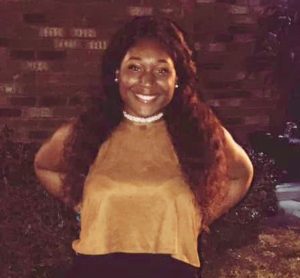
As a double minority, I can only say THANK YOU to Rachel Held Evans for her book, Inspired. It helped me to better understand my identity and how it shapes my experiences as an African American female. Religion is something I sometimes battle with because of the unexpected things that happen in life, but reading this book helped me discuss those issues OUT LOUD. I say out loud because most students, especially black ones, don’t feel the sense of compassion when we talk about these things … Inspired did not make feel marginalized by anyone or held down by any barrier. My main takeaway from Rachel is to speak out! Her legacy will definitely be remembered and passed on.
Kyla Cole is from Greenwood, Mississippi, and is a rising sophomore at Millsaps College. She is a published poet in Sunflower County’s literary magazine, and is majoring in Political Science and Education.
Mason Shrader, student
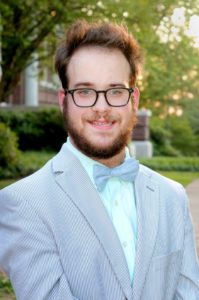
I first encountered Rachel Held Evans in a meaningful way when I was a freshman in college. This was a time a tumultuous time of faith deconstruction for me, as it is for many. In my search for voices asking questions similar to mine, I found a podcast in which Rachel was talking about her book Searching for Sunday. I almost passed it by, thinking that the subject of church-related trauma wasn’t really something I was struggling with. On a whim, however, I decided to play the podcast.
Within a few minutes of hearing Rachel talk, I was tearing up. As a disabled person, I have seen first-hand how parts of the institutionalized church can make people feel less than welcome. As Rachel spoke of longing for a spiritual home, I realized that I was exactly the person who needed her message. She spoke of being, marginalized, judged, and looked down upon by the Church, and yet she also spoke of her love for it. She taught me that I could acknowledge the pain caused by the Church, while still grappling with the love I have for it.
As a figure, she showed me that there are people who are searching just as I am. Her example even encouraged me to use my career to be a voice for change in the Church. For all these things and an incalculable number of others, I will always be grateful for the life of Rachel Held Evans.
Mason Shrader is a 22 year-old archaeology student who wants to teach people about the intersections of ancient perceptions of disability with Christianity. He is also desperately trying to make sense of the world and is learning how to sit in the mystery of faith when he cannot find any sense to be made.
Kate Thompson, student
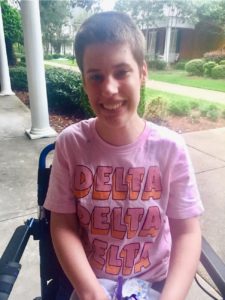
I’ve known of Him for my entire life. Because if you’re living in the South and you don’t at least that He exists, somehow it means that you lack a moral compass.
But I didn’t truly know Him until I got to college. I don’t even think I knew what it meant when I got baptized as a kid. I just knew it was something my grandmother had me do so that I wouldn’t die a painful death. That’s a lot of pressure to put on a child, so naturally as I got older I rejected faith all together.
Then I got to Millsaps. On campus we affectionately personify the college as, “Mother Millsaps,” and if she has taught me anything it’s that a relationship with God should be out of love, not fear.
Millsaps is a private college founded on Wesleyan theology. Our Wesleyan student study group picked Inspired as the book we were going read together, and I immediately connected with Rachel. In the church I grew up in, members weren’t allowed to ask questions. From Rachel I learned that God loves when we have a childlike faith because that means we care. He gave us brains so that we can question the text were given because that’s its purpose. What’s the point of any book if we’re not allowed of ask questions to deepen our understanding?
I’m thankful to Rachel every day for opening the door for me. Now instead of just knowing of God, I can now have a relationship that’s built on trust and love, it’s the most at peace I’ve ever felt. Because of Rachel’s teachings, people like me who’ve been hurt in the past can slowly but surely get their faith back. Because this relationship isn’t about fear and control, it’s about love and acceptance. Everyone has a spot at the open table; it just takes someone who spreads the word of God out of love and truth, to save you a seat. And when you’re ready to take it, every part of you shifts and changes for the better.
Kate Thompson is a member of the Gamma Zeta chapter of Tri Delta at Millsaps College. She’s an English major and hopes to get her master’s degree in library science to become an academic librarian.
Learn more about Rachel Held Evans and her work at rachelheldevans.com.
